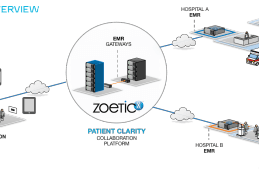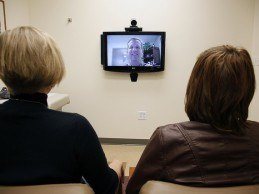In his HIMSS keynote address, Alphabet’s former executive chairman and now current technical advisor Eric Schmidt warned attendees that the “future of healthcare lies in the need for killer apps.” But he also cautioned that the transition to a better digitally connected health future isn't just one killer app, but a system of apps working together in the cloud. He also advocated transforming the massive amount of data held in EHRs into information and knowledge.Schmidt is correct in his
Read More
Will HIMSS18 Recognize The Disruption of the Traditional Office Visit?
Healthcare is evolving quickly and HIMSS 18 offers a broad range of healthcare issues to explore, but will it recognize the disruption of the traditional office visit?New requirements for implementing HIT systems are changing as new health IT priorities and procedures emerge. Convergence in the health care sector is accelerating the need for interoperability, not just for EHRs, but also across clinical, financial, and operational systems. This need is also challenging and changing one of the
Read More
3 Healthcare Revenue Cycle Management Drivers to Watch in 2018
One ageless trend emerging for 2018 is the quest of hospitals, larger carriers and clinics to identify new revenue streams; not just managing revenue cycles, but creating them. The healthcare industry is now looking at revenue which can be generated through the interoperability of Annual Wellness Visits (AWV), chronic care and service care transitions between physical and behavioral health services.Hospital systems and other healthcare facilities that can connect these services with technologies
Read More
Can Middleware Replace HIEs and Solve EHR Interoperability?
Editor's Note: Dr. Donald Voltz is a board-certified anesthesiologist, researcher, medical educator, and entrepreneur. The Office of the National Coordinator for Health Information Technology (ONC) is once again asking the health care community for its thoughts on establishing metrics to determine if or to the extent to which electronic health records are interoperable. The push to achieve interoperability is in response to last year’s mandate by Congress, contained in the Medicare Access and
Read More
Patient-Data Pipeline: The Missing Healthcare IT System Link
Part of today’s complexity in healthcare stems from the way our healthcare IT systems have emerged. There are multiple entry points for patients into the healthcare system, from a relationship with a primary care physician to the sporadic, disconnected and random interaction with emergency departments, urgent care and wellness clinics.
Based on current technology and the overall nature of the beast, it is highly doubtful that a single point of entry into the healthcare delivery system will
Read More
Hospitals To Reap Millions in CMS Reimbursement Revenue
Like most hospitals, Good Samaritan in St. Vincennes, Indiana was struggling with the typical EHR interoperability plaguing most healthcare facilities in which multiple EHR system cannot share data. However the 232-bed community health-care facility not only solved this common interoperability, but used it to unlock a treasure trove of CMS funds while also improving patient care.
Middleware, used for years to integrate data in financial and retail organizations with its simple open
Read More
Health IT Interoperability: The Battle with Frankenstein Continues…
Victor Frankenstein created his monster with a mix of parts, some chemistry and a touch of alchemy. Depending on how one looks at the fictional creation, although hideous, it was a successful experiment to create an emotional and sensitive creature. As we approach another Halloween night, health IT has its share of cobbled together solutions that for the most part are working, albeit with a great deal of frustration from both patients and physicians and for the most part on a local level. We
Read More
Applying Airbnb Data Principles to Health IT Interoperability
When we look outside the walls of traditional medicine, we can find innovative solutions that when applied appropriately, can create unforeseen benefits. Stuart Kauffmann, an evolutionary biologist and complexity systems researcher, proposed a theory where biological organisms can morph into more complex systems that expend less energy. The idea of increasing the complexity to gain some increased benefit has been applied to areas outside living organisms with some success.
Airbnb disrupted
Read More
How CMS Is Redefining Telemedicine with Its Chronic Care Management Service Guidelines
Telemedicine is about reaching out to patients in remote locations, but limited to videoconferencing between patients and health providers. It is similar to a face-to-face service with the exception that the patient and primary care provider are not physically together. Such efficient is limited in term of scope and only addresses the geographical challenge and scarcity of physician availability, a far cry from what CMS wanted for its Chronic Care Management Services (CMS) which would
Read More
What If Air Travel Worked Like Healthcare?
HIT consultants will have their work cut out for them if the healthcare industry gets serious about solving EHR’s lack of interoperability. Billions of dollars would be spent building the same easy to use applications consumers enjoy in other industries like banking and travel.
Imagine if banks did not have applications to support mortgage processing! Everything has to be done via a manual process, moving the loan through different verifications and approvals through human
Read More










